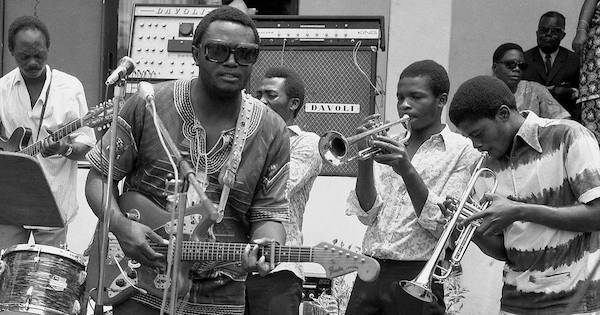Arts Feature: Best Music Documentaries of 2021 — and Some Disappointments
By Noah Schaffer
This list consists of recent music documentaries that I streamed over the past year — a couple of duds as well as the standouts.
Local cinemas may have reopened this year, but I saw all of one film in person (and it wasn’t a documentary). So yet again this list consists of recent music docs that I streamed over the year. Independently produced and distributed films often spend well over a year on the festival circuit, so some of these may have official studio release dates of 2020, while others made their festival debuts late this year and likely won’t be easily accessible in all markets for some time to come. If a specific film looks interesting but isn’t currently available, it’s worth visiting the film website to see if the film has an email list or a social media feed that lists upcoming streaming and in-person viewing opportunities.
The best:

A scene from The Rumba Kings.
The Rumba Kings – Africa and the Caribbean have had a decades-long musical conversation. One of the confab’s most glorious results: the sound of Congolese rumba that developed when musicians living under Belgium’s colonial rule picked up on Afro-Cuban rhythms. Grand Kallé, Dr. Nico, and the famously prolific Franco are among those who were part of Congolese rumba’s halcyon days. They’re profiled along with a surprising amount of high-quality footage and interviews from the era’s surviving musicians. While directors of docs about little-known genres often feel the need to include themselves in the mix, Rumba Kings filmmaker Alan Brain smartly leaves himself out of the film and simply lets the Congolese tell their own tale of the enduring music they made under brutal colonial oppression.

A scene from Poly Styrene: I Am a Cliché.
Poly Styrene: I Am a Cliché – The late ’70s explosion of punk rock is perhaps only second to the ’60s emergence of the Beatles and Dylan as the most overdocumented era in pop music history. Thus there is a high bar for any filmmaker trying to come up with a new angle. But there are some corners of that history still worth exploring, as proven by the story of Poly Styrene, a biracial female teenager whose X-Ray Spex band turned heads in a musical world that was largely dominated by white men. The X-Ray Spex didn’t last very long, and Styrene, struggling with mental issues, eschewed the spotlight until a well-received comeback shortly before her 2011 death. Like many music documentaries, the subject’s offspring had a role in its making. The memories aren’t always easy ones, but they’re revealed in an empathetic manner, making this a gripping film regardless of one’s interest in the music. [The movie is slated to screen at the Brattle in early February and on Showtime in June.] Arts Fuse review
Summer of Soul – Questlove is perhaps the most ubiquitous presence as a talking head in music docs — for instance, he appears in the recent films about Doc Severinsen and Herb Albert, both of which were endearing but too by-the-numbers to appear on this list. What he does with the astounding footage of the 1969 Harlem Cultural Festival makes one hope he spends more time on the other side of the camera — and that the songs by the likes of Sly and the Family Stone and the 5th Dimension that didn’t make it into this film will someday see the light of day. Instead of relying on critics or younger performers, Questlove finds audience members — a group often ignored in arts documentaries — and gives them a chance to talk about how the festival impacted and inspired them. Even if the backstory of how the footage was discovered didn’t really match the film’s marketing, Summer of Soul earned its hype as one of the most essential music documentary films of all time. Arts Fuse review
Fanny: The Right to Rock – If there was ever a band that was ahead of its time, it was Fanny. The early ’70s hard rockers weren’t just an all-female outfit that toured widely years before the Runaways or Go-Gos; the group included queer and Asian-American members. There’s a lot of pristine footage of the band in its heyday, as well as unflinching interviews with most of the members, including Western Massachusetts–based June Millington. The film doesn’t always place the group in proper context and it misses why the band’s rediscovery was so belated. (As Ann Powers did in this essay.) But the film still provides an excellent introduction.
No Ordinary Man – Billy Tipton certainly isn’t known for his jazz career, which consisted of journeyman road work and a pair of pleasant but unremarkable mid-’50s cocktail piano records. But his 1989 death made headlines when it was discovered that he had apparently been born female, something unknown to his longtime wife or adopted children. Clips of how the Tipton story was covered at the time underline how trans issues were sensationalized. But in the intervening years Tipton has become a queer icon of sorts — one West Coast jazz group named after Tipton has released 14 albums. Billy Tipton Jr. is interviewed about his father’s legacy, but much of this refreshingly unconventional film consists of young queer actors reading a script about Tipton’s life and discussing what they take away from his story.
Streetlight Harmonies – The sounds of group harmony doo-wop played a major role in the development of early rock, but often get short shrift when the tale of pop is told. This well-crafted documentary goes a long way toward remedying that. Given the advanced age of the artists interviewed, the filmmakers made the movie just in time. The story, from its gospel roots to its impact on Motown and beyond, is told perfectly.

A scene from Listening to Kenny G.
Listening to Kenny G – The smooth jazz soprano sax star has long been an easy critical punching bag, which makes him an excellent documentary subject. The insights about the man here aren’t especially revelatory — he’s even richer than we realized, thanks to being an early Starbucks investor, and he really likes to win. Where the film shines is in how it balances the perspective of jazz critics like Ben Ratliff and Will Layman with the appreciation that Kenny G’s listeners have for the role his songs have played in their lives. (Not explicitly stated, but clearly evident, is how smooth jazz has long attracted a large Black middle-class audience.) No Coltrane lover is likely to walk away with a newfound desire to hear more of Kenny’s music, but those prone to musical snobbery would be wise to consider the film’s points about what makes music good or bad. Arts Fuse review
Bitchin’: The Sound and Fury of Rick James – Rick James died as something of a Dave Chappelle punchline. This film gives him his credit as a significant funk and pop pioneer without ignoring the demons that led to his lengthy cocaine addiction and multiple prison stints for offenses that included the horrific kidnapping and abuse of women. Casual fans may be especially surprised about the story of James’s early years in Canada playing with Neil Young. Ultimately, the film more than makes its case for James as a key transitional figure, even as it shows how he was yet another artist whose own life rarely had the kind of happiness his music brought to others.
Disappointments:
Brian Wilson: Long Promised Road – Pretty much everything that should be avoided in a music documentary is on display here. The creative genius behind the Beach Boys has already been the subject of seemingly endless film and book projects. The main excuse for making the film seems to be that the infamously short-winded Wilson was interviewed for 70 hours — all of them during car rides or lunches with a friendly Rolling Stone reporter. But apparently so little of interest came from those chats that the film needed to be padded with clips from old Wilson interviews and, worst of all, celebrity talking heads like a Jonas Brother and a guy from the Foo Fighters who gets hauled in when Dave Grohl isn’t available. A scene where Wilson is shot sitting silently at a recent studio session while audio of his abusive father is being played seems especially exploitative. Arts Fuse review
Mr. Saturday Night – Robert Stigwood was one of the most successful movie and music business impresarios of the ’70s thanks to Saturday Night Fever, Grease, and the RSO label. But by the mid-’80s he had cashed out and his label had disappeared, with Stigwood spending the rest of his life dodging taxes on a yacht in the Caribbean. The film eschews talking heads for audio interviews and old footage — which conveniently masks how many of those interviews are rehashed from other sources. Ultimately Stigwood proves to be too much of an enigma for the filmmakers; this is essentially a portrait of a a guy who was really successful until he wasn’t. The coverage of how his reign ended is especially unsatisfying; for example, a lawsuit filed by his golden geese, the Bee Gees, is ignored. The story of Nick Cohn, the journalist whose New York Magazine article led to the film Saturday Night Fever proves to be more interesting than anything about Stigwood himself.
MORE: Jason M. Rubin’s Arts Fuse list of the Best Music Documentaries on TV.
Noah Schaffer is a Boston-based journalist and the co-author of gospel singer Spencer Taylor Jr.’s autobiography A General Becomes a Legend. He also is a correspondent for the Boston Globe and DigBoston, and spent two decades as a reporter and editor at Massachusetts Lawyers Weekly and Worcester Magazine. He has produced a trio of documentaries for public radio’s Afropop Worldwide, and was the researcher and liner notes writer for Take Us Home – Boston Roots Reggae from 1979 to 1988.
Tagged: Billy Tipton, Bitchin’: The Sound and Fury of Rick James, Brian Wilson: Long Promised Road, Fanny: The Right to Rock, Listening to Kenny G, Mr. Saturday Night, No Ordinary Man, Noah Schaffer, Poly Styrene: I Am a Cliché, Streetlight Harmonies, Summer of Soul
